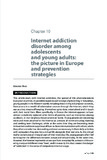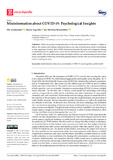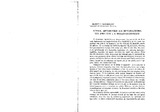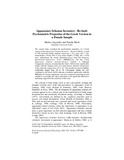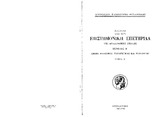Search
Now showing items 1-10 of 33
Internet addiction disorder among adolescents and young adults: the picture in Europe and prevention strategies
(2015)
This article deals with Internet addiction, the spread of this phenomenon in European countries, its possible causes as well as ways of preventing it. Nowadays, young people in the Western world, including those living in ...
September 11: Immediate and Long Term Effects on Measures of Aggression, Prejudice, and Person Perception
(North American Journal of Psychology, 2004)
Tests of aggression, prejudice and a measure of how much uniqueness or similarity we perceive in others were administered to participants the day before the terrorist attacks of 9/ 11, the day of the attacks, six and seven ...
Εισαγωγή στη Συμβολική Λογική
(Βάνιας, 2008)
Η λογική ε'ίναι η πρώτη επιστήμη που παρουσιάστηκε σε συστηματική μορφή τέτοια που να μπορεί να χρησιμοποιηθεί ακόμη και σήμερα. Το μεγάλο αυτό επίτευγμα που πραγματοποιείται από τον Αριστοτέλη στα Αναλυτικά Πρότερα, έγινε ...
Misinformation about COVID-19: Psychological Insights
(MDPI, 2021)
Definition: While the precise conceptualization of the term misinformation remains a subject of
debate, the current entry defines misinformation as any type of information which is misleading
or false, regardless of ...
Λογική, μεταφυσική και μεταφιλοσοφία στο έργο του Ι.Ν. Θεοδωρακόπουλου
(1975)
Ό κλασσικός άριστοτελικός διαχωρισμός της ρητορικής σε δικανική,
εmδεικτικη και συμβουλευτικη είναι παράλληλος με τον κοινό διαχωρισμό
του χρόνου της εμπειρίας και της γλώσσας σε παρελθόν,παρόν
και μέλλον. Aν τονίσουμε ...
Διαλεκτική Μέθοδος και Αριστοτελική Επιστήμη
(1988)
Στον Αριστοτέλη αποδίδονται οι τίτλοι του πατέρα της λογικής και πατέρα
της εmστήμης. Η διπλή αυτή πατρότητα έχει δημιουργήσει ένα κλασσικό
πρόβλημα για τους ερμηνευτές του Αριστοτέλη: πώς μπορεί να συμβιβαστεί
το αυστηρά ...
Mythos and Tragedy: A Study in Aristotelian Aesthetics
(Κέντρο Ερεύνης της Ελληνικής Φιλοσοφίας (Κ.Ε.Ε.Φ.), 1974)
Despite the overmentioned influence of Aristotle and the multitude of
interpretations of Aristotle from the Hellenistic times to the interpretation
of W. Jaeger and ewn to the more recent interpretations, a careful and ...
Appearance Schemas Inventory Revised: Psychometric Properties of the Greek Version in a Female Sample
(North American Journal of Psychology, 2013)
The current study examined the psychometric properties of a Greek version of the Appearance Schemas Inventory – Revised (ASI-R). A total of 269 university female students (mean age = 25.1 years, SD = 3.81; mean height = ...
The "Good" as a predicate
(Αριστοτέλειο Πανεπιστήμιο Θεσσαλονίκης, 1988)
I am investigating here the possibility of predicates being
ontologically fundamental in the sphere of the practical. I shall
therefore, attempt to reconstruct as favourably as I can Moore's
theory of the «good» as a ...
Interactions, Computations, and Experience: Interleaved Springboards of Cognitive Emergence
(Elsevier, 1999)
This rejoinder attempts to show that Bickhard's criticism is irrelevant to our theory and epistemologically one-sided. It is irrelevant because our theory is pragmaticist and interactivist at a number of levels ignored by ...

